|
2/7/2019 2 Comments The Fourth Week
From January 23rd to January 29th, our courtwatchers observed 243 cases at arraignment across three divisions of Boston Municipal Court (BMC Central, Roxbury, and Dorchester).[1]
This week, 43% of the cases we observed involved only charges that Suffolk County District Attorney Rachael Rollins has pledged to decline to prosecute, either by dismissing at arraignment or diverting through a non-criminal proceeding, program, or outcome. This means that almost half the cases we observed this week represented crimes that District Attorney Rollins has identified as low-level, non-violent crimes rooted in poverty, mental illness, and addiction. Since we began tracking data four weeks ago, on average “decline to prosecute” cases comprise 47% of all criminal dockets in the Suffolk County courts where we have been observing.
We want to mention up front that 25% of all 243 cases observed this week were driving charges. In other words, 25% of criminal dockets this week in these BMC courts were essentially aggravated traffic court—judges overseeing, and overwhelmingly diverting or dismissing, driving offenses for which folks are still frequently arrested and occasionally held in jail. This continues to concern us because of the human impact of criminal prosecutions in these cases and because it is a waste of the state’s resources to deal with these matters in criminal court. We believe the legislature should change laws to codify driving on a suspended or revoked license, without registration, and/or without insurance as civil offenses. Some judges already think of them that way.
Our digest again focuses on the data courtwatchers collected about cases that exclusively involved charges from DA Rollins’ Decline to Prosecute list.[2]
Reminder: under the umbrella of cases that DA Rollins pledged to decline to prosecute, we categorize cases that are dismissed outright as dismissals. Cases that are conditionally dismissed – with court costs, community service hours, or a treatment program – and therefore require a subsequent appearance in court are diverted cases. We remain concerned about the impact of imposing conditions which require time, money, or transportation on poor and working class people facing charges.
There were 105 cases involving ONLY charges on the decline to prosecute list this week.
Sometimes judges allow people to submit documentation in advance of a future court date to prove condition satisfaction. ADAs should always request this option to reduce the burdens of traveling to court and to prevent triggering a new cycle of criminal appearances from a default for supposed failure to appear if for some reason, like a hospital stay, the person can’t show up on the scheduled follow-up date. What gets dismissed?
|
|
|
Driving Charges (61 total)
|
|
|
Dismissed (without conditions)
|
38
|
62.3%
|
|
Diverted (with conditions)
|
15
|
24.6%
|
|
Released on Personal Recognizance
|
7
|
11.5%
|
|
Other outcome (arraignment continued)
|
1
|
1.6%
|
What gets diverted?
Much like dismissals, the vast majority of diversions were driving cases – 15 of the 22 (68.2%) cases diverted this week. For driving cases, judges usually gave the person an option of returning with proof of license/registration/insurance, paying a fee between $50 and $150, or completing 4 to 12 hours of community service. The precise outcome depended on the judge. In one unusual driving case the judge required payment of $500 or completion of 50 hours of community service.
As a reminder, completing community service within the requisite timeframe may mean people need to call out of or cancel work, miss classes, or arrange childcare.
The other diverted cases were:
|
|
Diverted Cases
(22 total: 15 driving charges, 7 other) |
|
|
Charge(s)
|
Type of Diversion
|
Outcome
|
|
Shoplifting
|
Community Service
|
Satisfied by time served in custody
|
|
Drug Possession
|
Drug Treatment
|
Return with proof of detox program
|
|
Threats
|
Mental Health
|
Sent for competency evaluation
|
|
Shoplifting
|
Community Service
|
10 hours at any charity
(in addition to time served in custody) |
|
Trespass
|
Court Condition
|
No new offenses in the next 3 months
|
|
Default
|
Court Condition
|
Register as a Sex Offender
|
|
Disturbing the Peace
|
Diversion Program
|
Referred for diversion evaluation
|
Release or Detention Decisions
In 4 cases exclusively involving charges DA Rollins pledged to decline this week, bail was set. The ADA asked for a bail equal to or higher than what the judge ultimately imposed in 3 of those 4 cases. In 2 of those cases, the individuals were experiencing homelessness, likely meaning any bail amount would be unaffordable and would keep the person in jail.
Here are those 3 stories:
- A man was charged with larceny under $1200 and defaults. The ADA asked for $250 bail for each case. The defense asked for release on personal recognizance; the man being arraigned is homeless and has no income. The judge ordered $250 bail on one case and release on personal recognizance on the other.
- A man was charged with trespass and a possible breaking and entering. Someone called the police on him for trying to open car doors. The police report didn't state that he actually opened any doors. He stated he was urinating in the parking lot. The ADA asked for $1,000 bail. The judge set $250 bail.
- A homeless woman, in custody & already held on $1200 bail, was charged with trespass & possession with intent to distribute. She is seeing a doctor for bi-polar disorder and depression, going through heroin withdrawal, and was enrolled in a methadone clinic. The ADA asked for an additional $500 bail. The judge imposed a nominal bail so she could accrue credit time while she remained held on the existing $1200 on the separate case, which apparently involved a drunken fight when she was living on the street.
In the remaining 6 cases, we don’t know the final release decision or case outcome because the arraignment was continued—i.e. postponed to a future date or time (2 cases), the person being arraigned remained detained (despite the judge deciding to release them on personal recognizance on the pending charges) in order to resolve a warrant in another court (1 case), the person was held on another open case for which they’d already been arraigned (1 case), the person was civilly committed (1 case), or the courtwatcher wasn’t sure what happened (1 case).
Our data collection on bail may undercount people who have already paid bail at the police station. Courtwatchers have not been able to reliably document when someone has already posted bail, and in what amount, if they are freely walking into court. This is not always explicitly addressed on the record. Bail is set at the police station by court clerks. How bail amounts are decided is not transparent to the public and bail is set with very little oversight.
Courtwatchers recorded 2 cases this week (1 involving driving charges; 1 involving disorderly conduct & wanton/malicious destruction of property) in which a judge adjusted someone’s bail to personal recognizance at their arraignment, ordering bail that had already been paid returned to the defendant.
The charge breakdowns are as follows [keep in mind that some folks had multiple charges]:
|
Charge
|
Number of Cases
Week 4 |
Total So Far
All 4 Weeks |
|
Trespass
|
7
|
35
|
|
Shoplifting
|
3
|
14
|
|
Larceny under $1200
|
3
|
15
|
|
Disorderly Conduct
|
1
|
12
|
|
Disturbing the Peace
|
1
|
2
|
|
Receiving Stolen Property
|
1
|
8
|
|
Driving Cases (suspended or revoked license or registration)
|
61
|
202
|
|
Breaking and entering for the purpose of shelter
|
(zero)
|
(zero)
|
|
Wanton/Malicious Destruction of Property
|
3
|
4
|
|
Threats (not domestic violence related)
|
2
|
8
|
|
Minor in Possession of Alcohol
|
(zero)
|
(zero)
|
|
Drug Possession
|
10
|
48
|
|
Drug Possession with Intent to Distribute
|
11
|
33
|
|
Resisting Arrest
|
(zero)
|
3
|
In 24 of these cases, the person being arraigned was in jail at the time of arraignment. Among those 24 individuals,
- 12 were released on personal recognizance,
- 4 had their cases diverted, and
- 1 had their case dismissed.
In other words, 17 people spent time in jail and ultimately were not prosecuted or were released; they were detained without an ability to shower, change clothes, see their kids, walk their pets, take their medications, or communicate with their jobs or families—only to have a judge determine there was no good reason to detain them.
Further, this means in 70.8% of cases in which a bail magistrate declined to release someone this week, the judge released the individual or diverted or dismissed that person’s case.
Over this past month, courtwatchers observed 74 people who were held in jail because a bail magistrate set an unaffordable bail. A total of 51 people were either released or not prosecuted after being jailed and appearing for their arraignment in custody.
Demographics[3] – Who is Prosecuted for these Offenses?
|
|
Of the 97 decline to prosecute cases observed this week in which courtwatchers noted demographic information, the racial breakdown of the people arraigned was as follows:
47.4% Black, 29.9% Latinx; 25.8% white, and 1.03% South Asian. |
According to the U.S. Census Bureau, the demographics of Suffolk County are as follows:
24.9% Black or African American, 22.9% Hispanic of Latino, 61.7% white, 9.1% Asian, 3.4% two or more races, .7% Native American or Alaskan Native, .2% Native Hawaiian or Pacific Islander |
Other Charges: Beyond the Decline to Prosecute List
Further, 5 cases observed this week were for drinking in public, a minor ordinance violation. As a point of comparison, that’s more than all breaking and entering and robbery cases we observed this week combined. All 5 cases were dismissed or diverted. In one of these cases, the man being arraigned was held in jail overnight starting at 7:30 PM, only to have his case entirely dismissed. Further, that five people were arrested, and 1 held in jail, a week before the City of Boston responded to public drinking with winks and nods to celebrate the New England Patriots lays bare how criminalization operates: punishing people not just for what they do, but for who they are, who they know, and where they go.
The most common charge in the non-DTP subset has consistently been some form of assault and battery--48 cases this week involved assault and battery. Of note, that figure still represents fewer cases than the 61 driving offenses in this week’s dataset.
Cause for Concern: Practices to Change
Courtwatchers observed 3 cases involving charges from the decline to prosecute list in which an ADA asked for bail. We again emphasize that ADAs should always recommend release on personal recognizance in cases when the person is not a flight risk and should never request bail for charges on the do not prosecute list.
Courtwatchers documented 21 cases this week involving charges from the decline to prosecute list in which ADAs asked for conditions instead of dismissing the case outright. In all cases, we hope ADAs seek the least burdensome outcome that will resolve the case. For all 15 charges DA Rollins has identified, we believe cases should generally be dismissed without conditions.
Though we’ve largely only seen this in cases involving at least one charge not on the decline to prosecute list, we want to flag the disturbing practice of asking for bail to be revoked. In one case this week, a homeless man was charged with breaking and entering and had a number of defaults. He was held in jail over the weekend on a probation hold. At arraignment, the ADA asked to revoke his bail on other cases.
If granted, bail revocation triggers a 60-day hold. The person would spend two months in jail without any recourse for release due to only being accused of a new crime. In the edited words of our courtwatcher, here is the story of the man this ADA was trying to keep in jail:
- He has 11 open cases and keeps returning to the same location - a Catholic school, Pope John Paul Academy - and throwing rocks. Not once did anyone ask why. He is homeless, was recently found incompetent, and is having a Rogers guardianship hearing. He goes to AA meetings and is med-compliant.
- The judge initially wanted a GPS shackle to keep him away from the school location, but the defense attorney argued against it successfully because the man lives at Pine Street Inn [where he would be unable to charge the device]. He has been working with Bay Cove.
- The ADA kept saying, "I don't know what to do here. But we can't keep letting him out and having him go back and harassing and vandalizing the school.” The judge denied the ADA’s request to revoke bail on prior cases. Everyone discussed the difficulty of handling a mental health issue through the courts.
- It was clear the ADA wasn’t considering his needs. Is keeping a 58-year-old homeless man with addiction, mental health, and competency issues in jail a better solution?
- The judge ordered a once-a-week report to probation. I kept thinking, "You're ordering him to report to probation once a week. Does it seem likely that he can do that? So you're just adding another thing he'll default on.” Broken, broken system.
Pursuant to the provisional policy on DA Rollins’ campaign website, line prosecutors are supposed to seek supervisor permission to prosecute these kinds of charges. This might be a good example of a time a supervisor would have said, "Seems like we’re criminalizing mental illness here and prosecuting this person is actually not leading to healthier or safer outcomes."
Policy: None Publicly Issued Yet
We have now tracked four weeks of data. We are more than one third of the way through the First 100 Days. To date, the District Attorney’s Office has not released a single office policy to formalize the decline to prosecute pledge which was a centerpiece of DA Rollins’ campaign.
Initially we thought this might be an issue of transparency as opposed to a failure to deliver on campaign pledges; perhaps DA Rollins had circulated internal office memos which had not been produced for the public, whether through a formal institutional press release or enterprising local reporting.
But in an article in The Appeal published this week, DA Rollins suggested that policy is still being finalized and will be forthcoming this month; she acknowledged that the draft policy “will consider people’s criminal records, mandate supervisor input on certain charges, and encourage diversion for people with mental health and substance use issues.”
The clock is ticking. As we mentioned last week, Wesley Bell in St. Louis County had day-one interim policy. DA Larry Krasner in Philadelphia released policy in an internal memo dated February 15th, about six weeks into his term. What’s the hold up on DA Rollins’ policy?
While we understand the inclination to be careful, thoughtful, and deliberate in crafting policy, DA Rollins had already announced the contours of her policy during the campaign. We had hoped she would have been able to implement day-one, or even month-one, interim policy, as other jurisdictions have done. We remain cautiously optimistic and look forward to the policy release.
Bail Policy
Not only has DA Rollins failed to release any formal policy on declining to charge these 15 offenses, she has not released any policy on bail.
In a press release last week regarding an amicus brief she signed in impact litigation supporting bail reform in Texas, DA Rollins is quoted as saying:
“This brief reflects the growing recognition that the cash bail system is no longer acceptable,” said District Attorney Rachael Rollins. “It leads to the unnecessary and unconstitutional detention of people who are indigent, deepens the cycle of poverty, disparately impacts Black and Latinx communities and eviscerates public trust in the justice system. We can and must do better, and that means we must challenge the money bail system wherever it exists.”
But if DA Rollins feels this way, she can’t just speak on it. She must act on it.
More than four weeks into her term, Assistant District Attorneys routinely ask for bail across all charges--even the 15 offenses she pledged to decline to prosecute. This goes against DA Rollins’ campaign promises, stated policy preferences, and litigation posturing. Her words are hollow if her employees continue to vitiate them.
If and when she implements policy, she will not be able to cure the harm her ADAs have already wrought. Parents who spent time in jail away from their children will never get that time back. People who lost their jobs due to system involvement will not suddenly find employment.
Across the country, elected prosecutors have publicly pledged to decline to ask for cash bail and have backed up those pledges with office policy. Templates exist on which DA Rollins could have already built.
|
Here are just a sampling of the jurisdictions with some kind of policy in place on declining bail:[4]
|
- Philadelphia DA Larry Krasner released a list of 25 offenses for which his office would not ask for cash bail.
- State’s Attorney Kim Foxx of Cook County, IL, has a policy to recommend I-bonds in most minor cases, including low-level felonies.
- New York City: District Attorney Cyrus Vance (Manhattan) and District Attorney Eric Gonzalez (Brooklyn) both pledged to decline to seek cash bail for misdemeanors and violations.
- DA Kim Ogg of Harris County, TX, directed her office to recommend defendants be released on their own recognizance as the default in most misdemeanor cases.
- Prosecuting Attorney Wesley Bell in St. Louis County, MO had day-one interim bail/bond policy for misdemeanors and certain felonies.
- Richmond, VA, Commonwealth Attorney Michael Herring announced in April 2018 that prosecutors in his office would no longer seek cash bail in any cases.
- Arlington County, VA, Commonwealth Attorney Theo Stamos announced in November that her office will no longer request cash bail in low-level misdemeanor cases.
- Chesterfield County, VA, Commonwealth Attorney Scott Miles ran on a platform including no longer seeking cash bail for nonviolent cases and, despite just taking office, had already unveiled an interoffice directive on cash bail in December.
As of today, as far as we know there is no bail policy in Suffolk County.
At the very least, DA Rollins could have issued and implemented interim policy advising her ADAs not to seek bail on the 15 offenses she campaigned on declining. Despite her public rhetoric on the harm of bail, DA Rollins has failed to deliver.
Without a doubt, there are individuals in jail right now because DA Rollins failed to craft bail policy in a timely way. We know this because we have been telling their stories.
ICE Security Policy
DA Rollins has made a number of public statements reflecting her concerns with how ICE operates in Suffolk County courts. We share these concerns; we have witnessed too many neighbors picked up by ICE and separated from their families, despite existing judicial precedent designed to protect sanctuary in Boston.
During her campaign, DA Rollins announced that within her first 30 days in office, she would “implement a door-to-door security plan utilizing victim witness advocates and civil rights and defense attorneys to escort undocumented parties to and from the courthouse safely.”
While we understand the specifics of the plan have to be “kept confidential for important security reasons,” DA Rollins promised to “share with the public as much of the plan as possible without jeopardizing the safety and security of the parties the plan is intended to protect.”
To date, her office has made no public statements about even the existence of any such plan. And her self-imposed 30-day deadline has passed. Where is the plan?
Takeaways: Reactions from the CourtWatch MA team
Even if and as the trend line continues, the Suffolk County District Attorney’s Office is still actively prosecuting people for these crimes. In many cases folks face court costs or community service hours to resolve their cases and are given future court appearances to prove compliance.
DA Rollins was elected with “an astounding 82 percent of the vote in the general election.” The people of Suffolk County voted for her at least in part because of this bold platform to decline to prosecute crimes of poverty, addiction, and mental illness; her website listed these 15 offenses as “charges to be declined.”
Over the past week DA Rollins was asked by a reporter for The Appeal to confront and explain the SCDAO’s decision with respect to certain cases we highlighted on twitter—cases we felt were inconsistent with her campaign platform. Her spokesperson justified the decisions as (1) in keeping with her stated campaign pledge and (2) “a reasonable use of discretion” as policy is finalized.
The prior SCDAO administration led by conservative Democrat Dan Conley similarly trumpeted a strategy of embracing “effective alternatives to traditional prosecution and sentencing,” resulting in “simultaneous declines in Suffolk County prosecutions and incarceration as violent crime dropped in Boston.”
DA Rollins was elected over Dan Conley’s hand-picked successor with a mandate for change. So why is she following in his footsteps? A progressive DA shouldn’t maintain the status quo, especially when something different was promised.
DA Rollins has been in office for more than a month. She ran on a platform of transparency. She has yet to institute policy or train ADAs to modify their conduct in court. DA Rollins can renew public trust with a public release of office policy and SCDAO internal office data. We’re waiting. And we’ll be watching.
[2] Because of limited capacity of the CourtWatch MA team, we again did not verify every case against the limited available charge information on masscourts.org. We have verified the charge in any case where the courtwatcher left the charge blank, did not hear the charge, or noted that reading the charge was waived in court. It is of course possible courtwatchers misheard the charge(s) in any given case; we reiterate that our data collection is not a substitute for open government and we are very hopeful that District Attorney Rollins will release data tracked by the Suffolk County District Attorney’s Office with some regularity going forward.
[3] Courtwatchers write down demographic information (age, race, gender) based on observation alone; we recognize that this is an imperfect way to determine markers of identity. We ask courtwatchers to note this information because (1) courts are unlikely to disclose this information even if we requested every docket; and (2) the system operates based on an individual’s outward perception and expression, regardless of their stated identity, so demographic observations are a reasonable methodology for this particular project. We again reiterate that courtwatchers can select as many racial demographic markers as apply.
[4] We are not holding these jurisdictions up as models to emulate for the substance of their policies; in a number of these places, line prosecutors continue to seek bail despite stated policy, whether because the policy is being poorly implemented or because the exceptions swallow the rule. We are highlighting these policies merely to illustrate that having a policy on bail is the very least DA Rollins could do to be as transparent as her peers and consistent with her public statements.
It's interesting to see the data on how the Suffolk County District Attorney Rachael Rollins' pledge to decline certain prosecutions is playing out in practice. The focus on low-level, non-violent crimes rooted in poverty, mental health, and addiction is crucial. However, the high percentage of driving cases in the criminal docket is concerning, and the suggestion to treat them as civil offenses makes sense. It's essential to consider the impact of imposing conditions on individuals facing charges, particularly those with limited resources.
Leave a Reply.
Author
Court Watch MA is a community project with the goal of shifting the power dynamics in our courtrooms by exposing the decisions judges and prosecutors make about neighbors every day.
Archives
November 2019
September 2019
June 2019
April 2019
March 2019
February 2019
January 2019
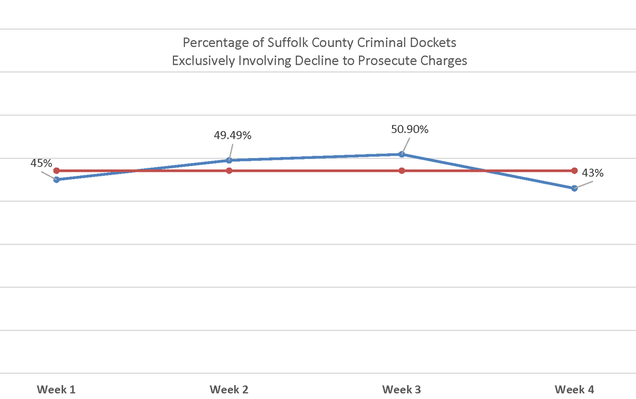
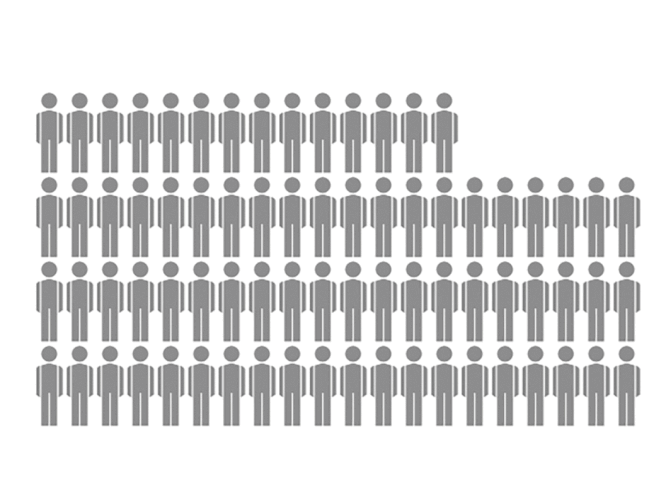
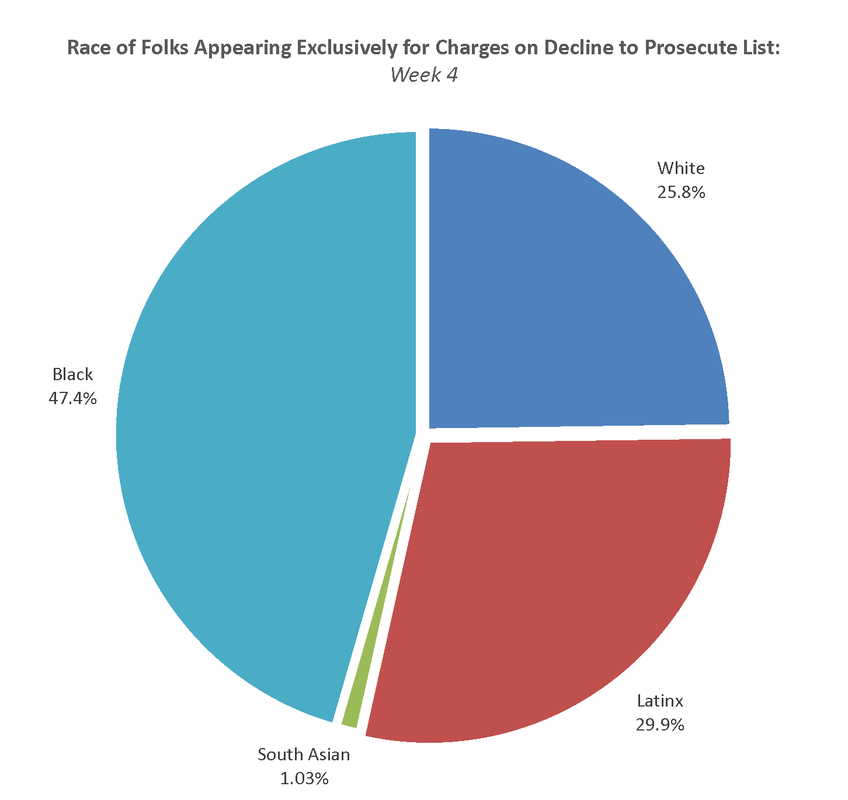
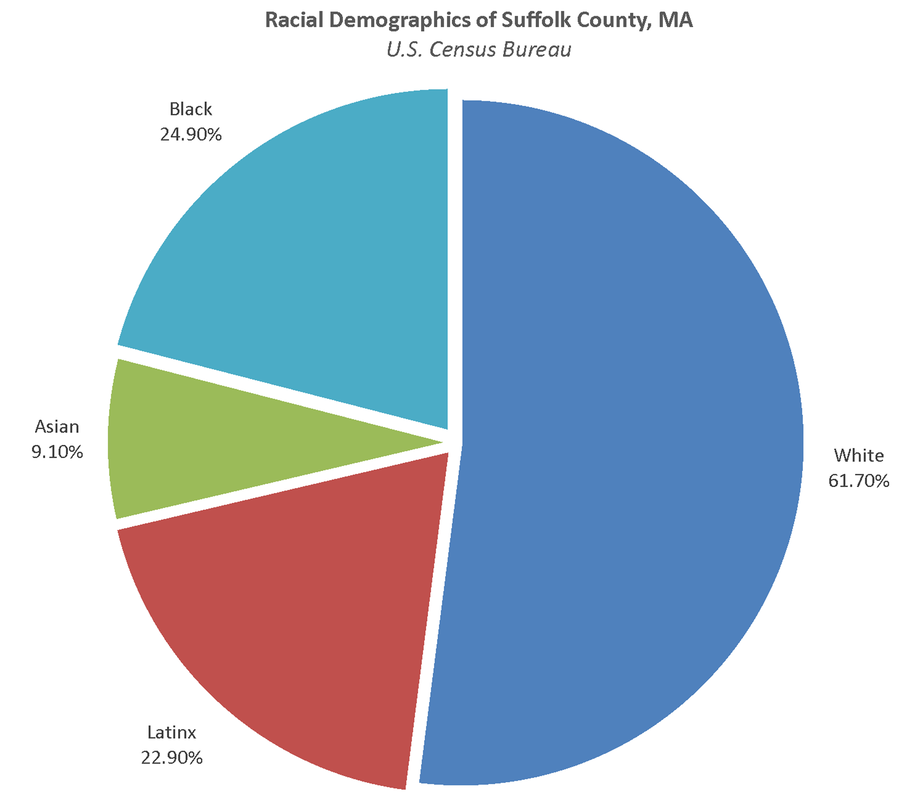
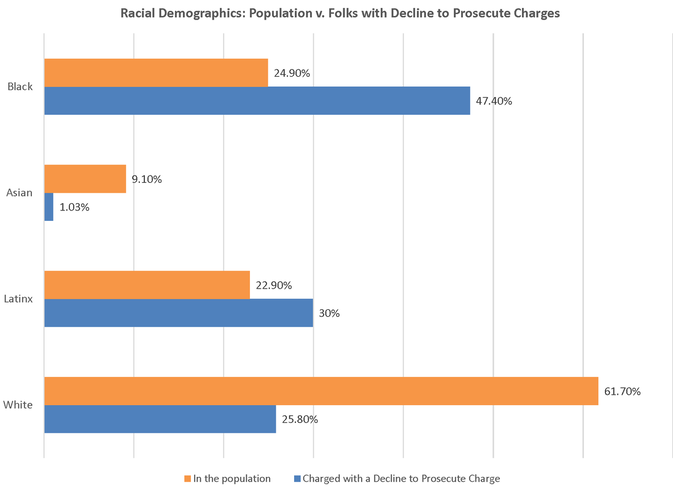

 RSS Feed
RSS Feed